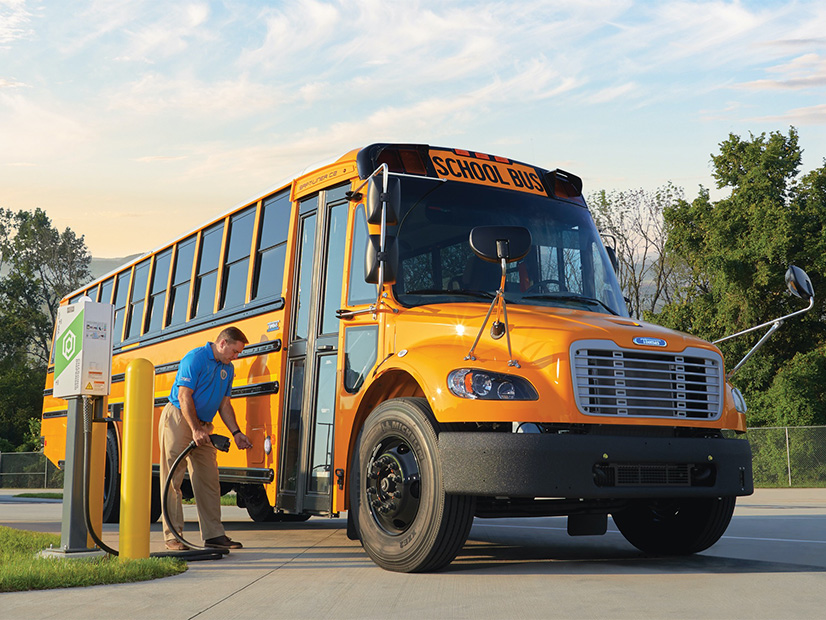
The Nevada Legislature wrapped up its 2023 regular session by passing bills related to integrated resource planning for electric and gas utilities, along with a bill creating a zero-emission truck incentive program.
Assembly Bill 524 passed on a 20-1 Senate floor vote just hours before the legislature adjourned at 11:59 p.m. on Monday.
Assemblyman Howard Watts (D) introduced the bill with the goal of reducing electric utilities’ reliance on the open energy market to acquire sufficient supply. That in turn might improve electric reliability and reduce consumer costs, he said.
The bill would require utilities to include in their integrated resource plans a scenario in which they acquire enough energy resources to close their open position. Although that scenario must be evaluated, it wouldn’t necessarily be the one chosen. (See Bill Would Require NV Energy to Examine Market Reliance.)
NV Energy opposed the bill, saying the legislature should go further by calling for utilities to quickly close their open positions.
AB 524, which previously passed unanimously in the Assembly, now goes to Gov. Joe Lombardo for a signature. In a March executive order, Lombardo called for the state’s “advancement of energy independence.”
The state’s legislature meets every other year in a 120-day session. Although the regular session has ended, Lombardo is expected to call a special session on unresolved budget issues.
The 2023 legislature also passed Senate Bill 281 by Sen. Rochelle Nguyen (D).
The bill would require natural gas utilities to file a plan every three years, similar to the IRPs filed by electric utilities. The bill aims to improve the transparency of gas utility planning. (See Nev. Bill Would Require Gas Company Efficiency, GHG Plans.)
The Senate and Assembly both unanimously passed the bill, which was backed by Southwest Gas.
Zero-emission Truck Incentive
Another bill introduced by Watts this year was AB 184, which directs the Nevada Division of Environmental Protection to work with the state Department of Transportation to establish a Clean Trucks and Buses Incentive Program.
The incentives would be funded through the federal Carbon Reduction Program, part of the Infrastructure Investment and Jobs Act.
Nevada will receive an estimated $57 million over five years through the federal program. Of that, 35% is flexible funding that could be applied to the incentive program, Watts said during a hearing this month before the Senate Natural Resources Committee. No state funding would go toward the incentives.
The incentives would be for the purchase of a zero-emission medium- or heavy-duty truck, including a battery electric or hydrogen fuel cell vehicle. Base incentive amounts would range from $20,000 for a Class 2b truck to $175,000 for a Class 8 truck.
Increases to the base incentive would also be available in some cases. For example, a small business could receive a 20% increase to the base incentive, and a disadvantaged small business, such as one owned by a minority, woman or veteran, would be eligible for a 5% increase. A truck buyer could combine up to two base incentive increases.
Independent truck operators would be eligible for a 33% increase to the base incentive amount, but they wouldn’t be able to add on the small business increase.
The incentives would be available to businesses, nonprofits, and state and local government agencies. Watts said the idea was to bring the cost of a zero-emission truck in line with that of its diesel counterpart.
Andrew MacKay, executive director of the Nevada Franchised Auto Dealers Association, said zero-emission trucks are cost-prohibitive for most independent truck operators and small operators.
“This bill’s transformative,” MacKay said during the committee hearing. “It’s going to put these people in a position … of being able to afford these vehicles.”
Another bill by Watts adds new requirements for state automobile fleets. AB 262 requires the state to give preference to vehicles that minimize emissions and give consideration to the lifetime cost of the vehicle when making purchasing decisions, “to the extent practicable.”
Lombardo signed the bill on Monday.
Ben Prochazka, executive director of the Electrification Coalition, said Tuesday that electric vehicles are typically less expensive to operate than those with internal combustion engines.
“AB 262 will save Nevada’s taxpayers money and signal that the state is demonstrating leadership as the U.S. rapidly accelerates toward transportation electrification,” Prochazka said in a statement.
Yucca Bill Fails
Bills that failed during the 2023 legislative session include Senate Joint Resolution 4, introduced by state Sen. James Ohrenschall (D). SJR 4 would have urged the federal government to use Yucca Mountain for the development and storage of renewable energy. The site, about 100 miles from Las Vegas, has been eyed as a disposal site for the nation’s high-level radioactive waste. (See Nevada Resolution Seeks to Bring Renewables to Yucca Mountain.)
But SJR 4 missed the deadline for passage from its first committee, Senate Natural Resources.
